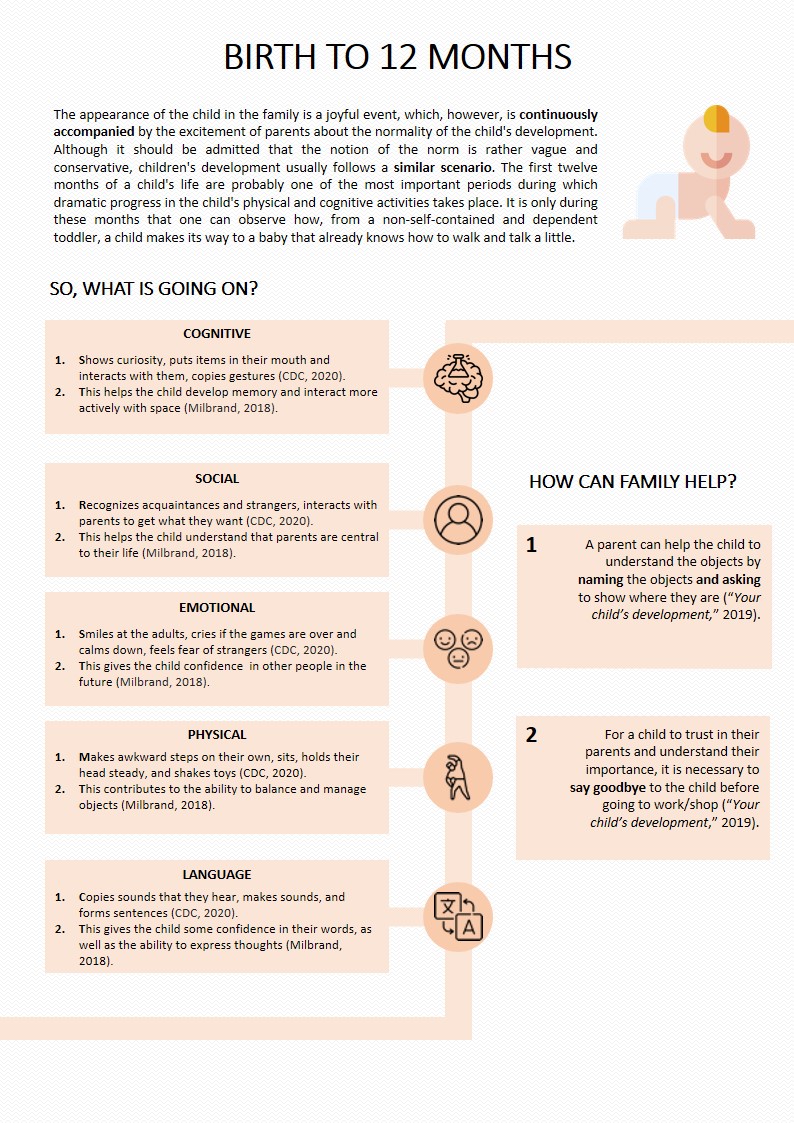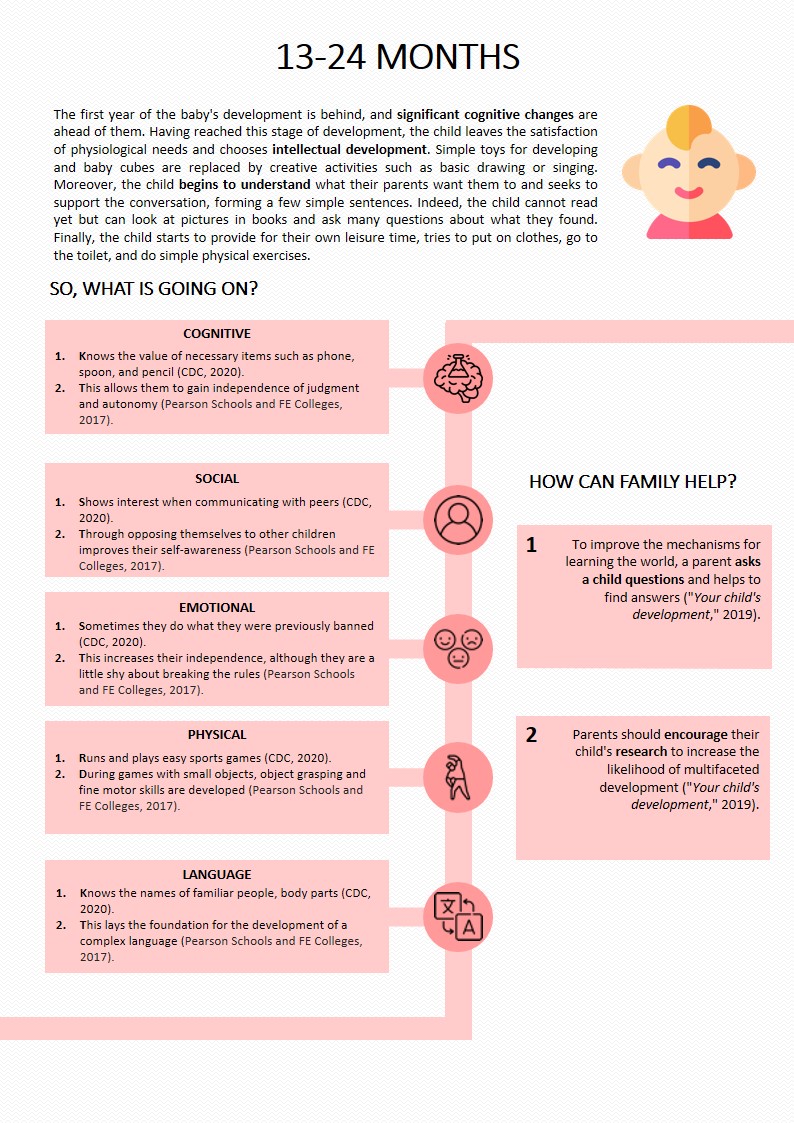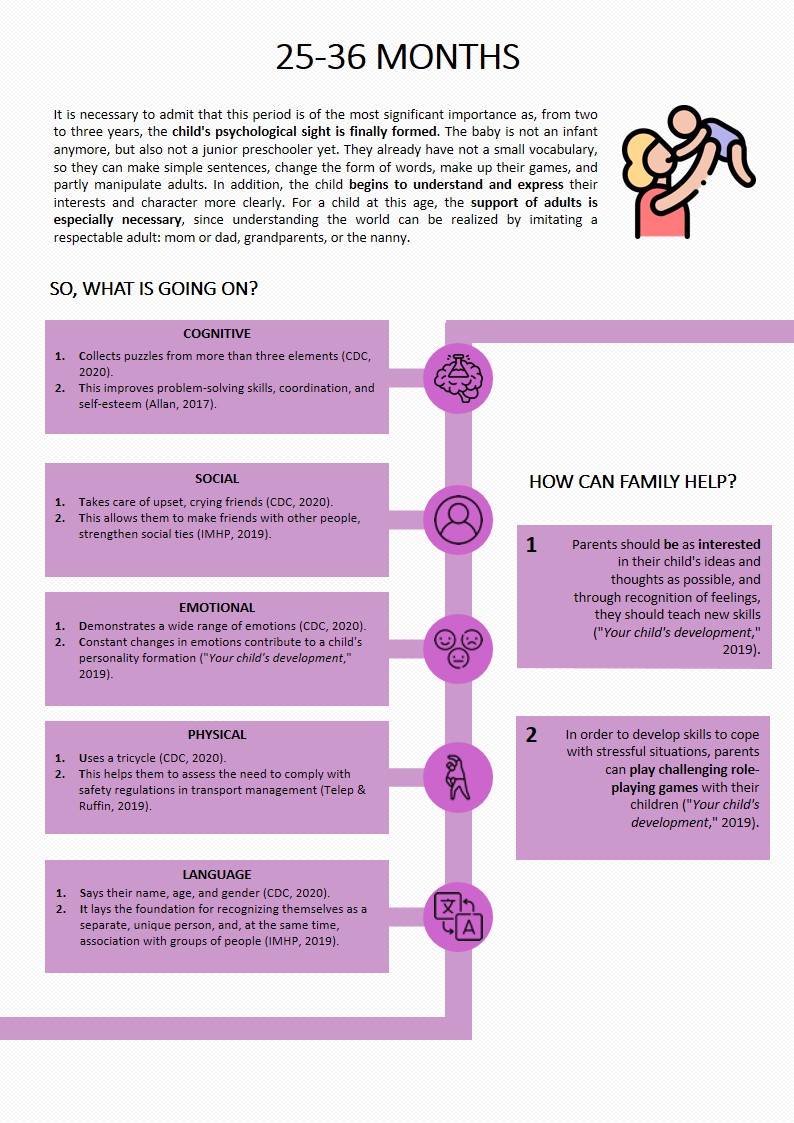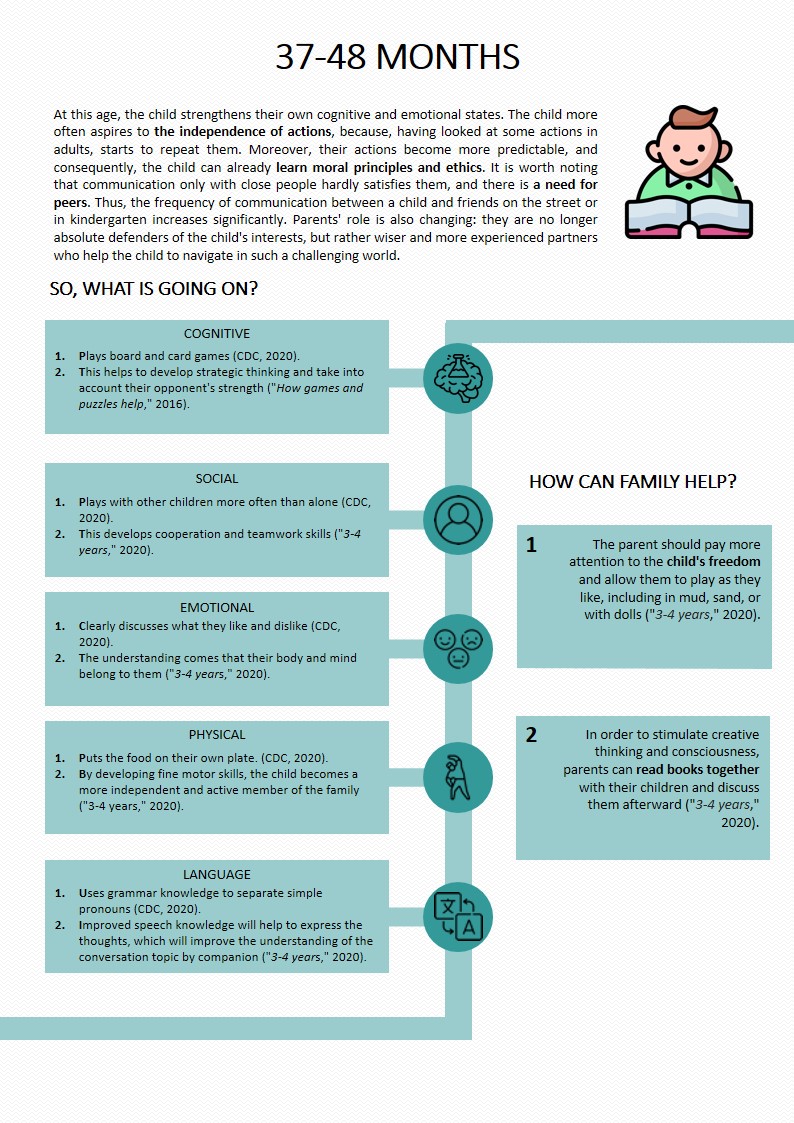Birth to 12 Months
The appearance of the child in the family is a joyful event, which, however, is continuously accompanied by the excitement of parents about the normality of the child’s development. Although it should be admitted that the notion of the norm is rather vague and conservative, children’s development usually follows a similar scenario. The first twelve months of a child’s life are probably one of the most important periods during which dramatic progress in the child’s physical and cognitive activities takes place. It is only during these months that one can observe how, from a non-self-contained and dependent toddler, a child makes its way to a baby that already knows how to walk and talk a little.
So, What Is Going On?
- Cognitive:
- Shows curiosity, puts items in their mouth and interacts with them, copies gestures (CDC, 2020).
- This helps the child develop memory and interact more actively with space (Milbrand, 2018).
- Social:
- Recognizes acquaintances and strangers, interacts with parents to get what they want (CDC, 2020).
- This helps the child understand that parents are central to their life (Milbrand, 2018).
- Emotional:
- Smiles at the adults, cries if the games are over and calms down, feels fear of strangers (CDC, 2020).
- This gives the child confidence in other people in the future (Milbrand, 2018).
- Physical:
- Makes awkward steps on their own, sits, holds their head steady, and shakes toys (CDC, 2020).
- This contributes to the ability to balance and manage objects (Milbrand, 2018).
- Language:
- Copies sounds that they hear, makes sounds, and forms sentences (CDC, 2020).
- This gives the child some confidence in their words, as well as the ability to express thoughts (Milbrand, 2018).
How Can Family Help?
A parent can help the child to understand the objects by naming the objects andasking to show where they are (“Your child’s development,” 2019).
For a child to trust in their parents and understand their importance, it is necessary to say goodbye to the child before going to work/shop (“Your child’s development,” 2019).

13-24 Months
The first year of the baby’s development is behind, and significant cognitive changes are ahead of them. Having reached this stage of development, the child leaves the satisfaction of physiological needs and chooses intellectual development. Simple toys for developing and baby cubes are replaced by creative activities such as basic drawing or singing. Moreover, the child begins to understand what their parents want them to and seeks to support the conversation, forming a few simple sentences. Indeed, the child cannot read yet but can look at pictures in books and ask many questions about what they found. Finally, the child starts to provide for their own leisure time, tries to put on clothes, go to the toilet, and do simple physical exercises.
So, What Is Going On?
- Cognitive:
- Knows the value of necessary items such as phone, spoon, and pencil (CDC, 2020).
- This allows them to gain independence of judgment and autonomy (Pearson Schools and FE Colleges, 2017).
- Social:
- Shows interest when communicating with peers (CDC, 2020).
- Through opposing themselves to other children improves their self-awareness (Pearson Schools and FE Colleges, 2017).
- Emotional:
- Sometimes they do what they were previously banned (CDC, 2020).
- This increases their independence, although they are a little shy about breaking the rules (Pearson Schools and FE Colleges, 2017).
- Physical:
- Runs and plays easy sports games (CDC, 2020).
- During games with small objects, object grasping and fine motor skills are developed (Pearson Schools and FE Colleges, 2017).
- Language:
- Knows the names of familiar people, body parts (CDC, 2020).
- This lays the foundation for the development of a complex language (Pearson Schools and FE Colleges, 2017).
How Can Family Help?
To improve the mechanisms for learning the world, a parent asks a child questions and helps to find answers (“Your child’s development,” 2019).
Parents should encourage their child’s research to increase the likelihood of multifaceted development (“Your child’s development,” 2019).

25-36 Months
It is necessary to admit that this period is of the most significant importance as, from two to three years, the child’s psychological sight is finally formed. The baby is not an infant anymore, but also not a junior preschooler yet. They already have not a small vocabulary, so they can make simple sentences, change the form of words, make up their games, and partly manipulate adults. In addition, the child begins to understand and express their interests and character more clearly. For a child at this age, the support of adults is especially necessary, since understanding the world can be realized by imitating a respectable adult: mom or dad, grandparents, or the nanny.
So, What Is Going On?
- Cognitive:
- Collects puzzles from more than three elements (CDC, 2020).
- This improves problem-solving skills, coordination, and self-esteem (Allan, 2017).
- Social:
- Takes care of upset, crying friends (CDC, 2020).
- This allows them to make friends with other people, strengthen social ties (IMHP, 2019).
- Emotional:
- Demonstrates a wide range of emotions (CDC, 2020).
- Constant changes in emotions contribute to a child’s personality formation (“Your child’s development,” 2019).
- Physical:
- Uses a tricycle (CDC, 2020).
- This helps them to assess the need to comply with safety regulations in transport management (Telep & Ruffin, 2019).
- Language:
- Says their name, age, and gender (CDC, 2020).
- It lays the foundation for recognizing themselves as a separate, unique person, and, at the same time, association with groups of people (IMHP, 2019).
How Can Family Help?
Parents should be as interested in their child’s ideas and thoughts as possible, and through recognition of feelings, they should teach new skills (“Your child’s development,” 2019).
In order to develop skills to cope with stressful situations, parents can play challenging role-playing games with their children (“Your child’s development,” 2019).

37-48 Months
At this age, the child strengthens their own cognitive and emotional states. The child more often aspires to the independence of actions, because, having looked at some actions in adults, starts to repeat them. Moreover, their actions become more predictable, and consequently, the child can already learn moral principles and ethics. It is worth noting that communication only with close people hardly satisfies them, and there is a need for peers. Thus, the frequency of communication between a child and friends on the street or in kindergarten increases significantly. Parents’ role is also changing: they are no longer absolute defenders of the child’s interests, but rather wiser and more experienced partners who help the child to navigate in such a challenging world.
So, What Is Going On?
- Cognitive:
- Plays board and card games (CDC, 2020).
- This helps to develop strategic thinking and take into account their opponent’s strength (“How games and puzzles help,” 2016).
- Social:
- Plays with other children more often than alone (CDC, 2020).
- This develops cooperation and teamwork skills (“3-4 years,” 2020).
- Emotional:
- Clearly discusses what they like and dislike (CDC, 2020).
- The understanding comes that their body and mind belong to them (“3-4 years,” 2020).
- Physical:
- Puts the food on their own plate. (CDC, 2020).
- By developing fine motor skills, the child becomes a more independent and active member of the family (“3-4 years,” 2020).
- Language:
- Uses grammar knowledge to separate simple pronouns (CDC, 2020).
- Improved speech knowledge will help to express the thoughts, which will improve the understanding of the conversation topic by companion (“3-4 years,” 2020).
How Can Family Help?
The parent should pay more attention to the child’s freedom and allow them to play as they like, including in mud, sand, or with dolls (“3-4 years,” 2020).
In order to stimulate creative thinking and consciousness, parents can read books together with their children and discuss them afterward (“3-4 years,” 2020).

References
- Allan, S. (2017). Suitable puzzles for my child: Age, type and gender. Web.
- CDC. (2020). Milestone checklists. Web.
- How games and puzzles help a child’s development. (2016). Web.
- IMHP. (2019). Ages and stages. Web.
- Milbrand, L. (2018). Monthly baby milestone chart. Web.
- Pearson Schools and FE Colleges (2017). Child development from birth up to 5 years. Web.
- Telep, V. G., & Ruffin, N. J. (2019). Tips on toys. Web.
- 3-4 years: Preschooler development. (2020). Web.
- Your child’s development: Age-based tips from birth to 36-months (2019). Web.